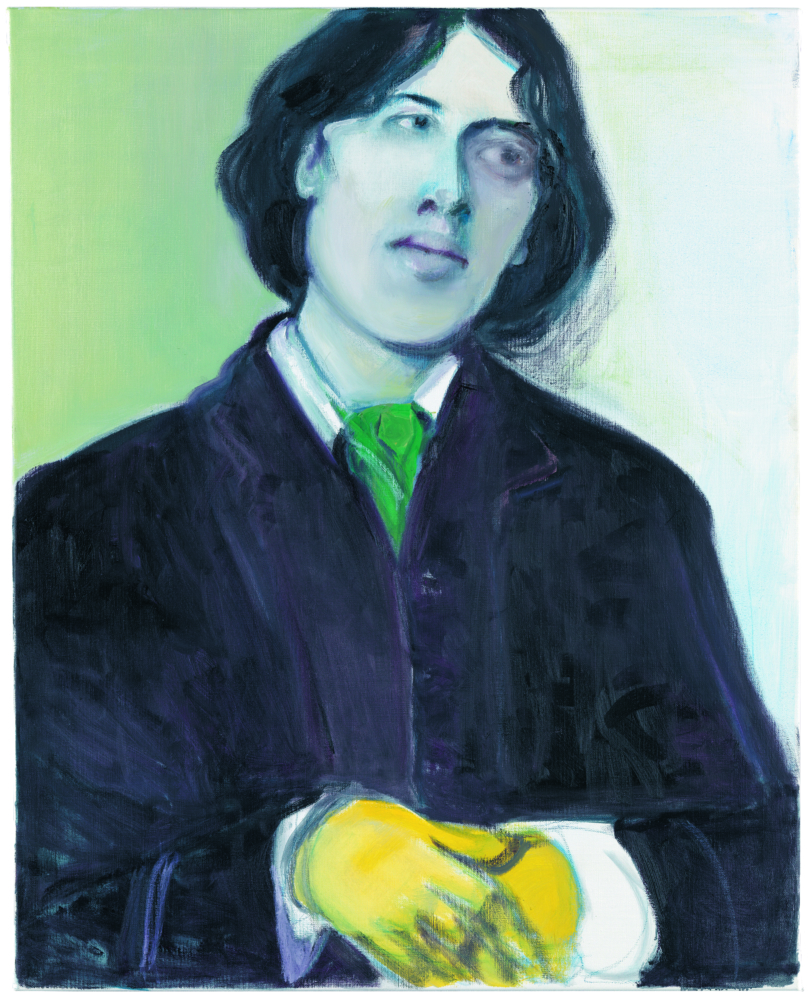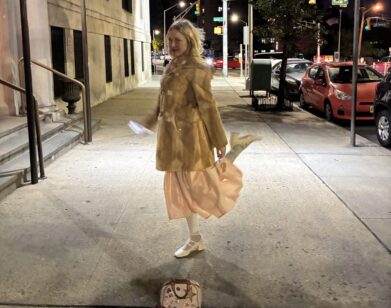Two Oscar Wilde Characters Ponder the Meaning of Life, Art, and Cigarettes

Marlene Dumas, Oscar Wilde, 2016. Tate, London.
It’s an age-old question: what is the fundamental relation between criticism and the art on which it expounds? Amidst today’s ever-churning machines of social outrage, where opinion is the currency with which the culture trades, Oscar Wilde’s singularly irreverent musings on art, literature, and all its critics remain astoundingly resonant. The Critic as Artist, which has been recently re-released by David Zwirner Books, takes the form of an extended, rambling, tobacco-clouded conversation between two imagined figures—Ernest, Wilde’s alter ego, an insistent proponent of “art for art’s sake,” and Gilbert, ever the devil’s advocate. Below, we have extracted part of the conversation between the two men as they wrangle for the proper answer to the age-old philosophical quandary. Spoiler alert: it involves cigarettes, daffodils, and many a roast of cultural journalists. (We’re only slightly offended.)
———
GILBERT [at the piano]: My dear Ernest, what are you laughing at?
ERNEST [looking up]: At a capital story that I have just come across in this volume of Reminiscences that I have found on your table.
GILBERT: What is the book? Ah! I see. I have not read it yet. Is it good?
ERNEST: Well, while you have been playing, I have been turning over the pages with some amusement, though, as a rule, I dislike modern memoirs. They are generally written by people who have either entirely lost their memories, or have never done anything worth remembering; which, however, is, no doubt, the true explanation of their popularity, as the English public always feels perfectly at its ease when a mediocrity is talking to it.
GILBERT: Yes: the public is wonderfully tolerant. It forgives everything except genius. But I must confess that I like all memoirs. I like them for their form, just as much as for their matter. In literature mere egotism is delightful. […] Even in actual life egotism is not without its attractions. When people talk to us about others they are usually dull. When they talk to us about themselves they are nearly always interesting, and if one could shut them up, when they become wearisome, as easily as one can shut up a book of which one has grown wearied, they would be perfect absolutely.
GILBERT: Formerly we used to canonise our heroes. The modern method is to vulgarise them. Cheap editions of great books may be delightful, but cheap editions of great men are absolutely detestable.
ERNEST: May I ask, Gilbert, to whom you allude?
GILBERT: Oh! to all our second-rate littérateurs. We are overrun by a set of people who, when poet or painter passes away, arrive at the house along with the undertaker, and forget that their one duty is to behave as mutes. But we won’t talk about them. They are the mere body-snatchers of literature. The dust is given to one, and the ashes to another, and the soul is out of their reach. And now let me play Chopin to you, or Dvorák? Shall I play you a fantasy by Dvorák? He writes passionate, curiously coloured things.
ERNEST: No; I don’t want music just at present. It is far too indefinite. Turn round and talk to me. Talk to me till the white-horned day comes into the room. There is something in your voice that is wonderful.
GILBERT [rising from the piano]: I am not in a mood for talking tonight. I really am not. How horrid of you to smile! Where are the cigarettes? Thanks. How exquisite these single daffodils are! They seem to be made of amber and cool ivory. They are like Greek things of the best period. Music always seems to me to produce that effect. It creates for one a past of which one has been ignorant, and fills one with a sense of sorrows that have been hidden from one’s tears. I can fancy a man who had led a perfectly commonplace life, hearing by chance some curious piece of music, and suddenly discovering that his soul, without his being conscious of it, had passed through terrible experiences, and known fearful joys, or wild romantic loves, or great renunciations.
ERNEST: […] Seriously speaking, what is the use of art-criticism? Why cannot the artist be left alone, to create a new world if he wishes it, or, if not, to shadow forth the world which we already know, and of which, I fancy, we would each one of us be wearied if Art, with her fine spirit of choice and delicate instinct of selection, did not, as it were, purify it for us, and give to it a momentary perfection. It seems to me that the imagination spreads, or should spread, a solitude around it, and works best in silence and in isolation. Why should the artist be troubled by the shrill clamour of criticism? Why should those who cannot create take upon themselves to estimate the value of creative work? What can they know about it? If a man’s work is easy to understand, an explanation is unnecessary …
GILBERT: And if his work is incomprehensible, an explanation is wicked.
ERNEST: I did not say that.
GILBERT: Ah! but you should have. Nowadays, we have so few mysteries left to us that we cannot afford to part with one of them.
ERNEST: In the best days of art there were no art-critics.
GILBERT: I seem to have heard that observation before, Ernest. It has all the vitality of error and all the tediousness of an old friend.
ERNEST: Yes: there is no use your tossing your head in that petulant manner. It is quite true. In the best days of art there were no art-critics. The sculptor hewed from the marble block the great white-limbed Hermes that slept within it. The waxers and gilders of images gave tone and texture to the statue, and the world, when it saw it, worshipped and was dumb. He poured the glowing bronze into the mould of sand, and the river of red metal cooled into noble curves and took the impress of the body of a god. […] Men and women, with pleasure or sorrow in their faces, passed before him. He watched them, and their secret became his. Through form and colour he re-created a world. By the Ilyssus, my dear Gilbert, there were no silly art congresses bringing provincialism to the provinces and teaching the mediocrity how to mouth. By the Ilyssus there were no tedious magazines about art, in which the industrious prattle of what they do not understand. On the reed-grown banks of that little stream strutted no ridiculous journalism monopolising the seat of judgment when it should be apologising in the dock. The Greeks had no art-critics.
GILBERT: Ernest, you are quite delightful, but your views are terribly unsound. I am afraid that you have been listening to the conversation of someone older than yourself. That is always a dangerous thing to do, and if you allow it to degenerate into a habit you will find it absolutely fatal to any intellectual development. As for modern journalism, it is not my business to defend it. It justifies its own existence by the great Darwinian principle of the survival of the vulgarest. I have merely to do with literature.
ERNEST: But what is the difference between literature and journalism?
GILBERT: Oh! journalism is unreadable, and literature is not read. That is all.
ERNEST: You are horribly wilful. I insist on your discussing the matter with me. You have said that the Greeks were a nation of art-critics. What art-criticism have they left us?
GILBERT: My dear Ernest, even if not a single fragment of art-criticism had come down to us from Hellenic or Hellenistic days, it would be none the less true that the Greeks were a nation of art-critics, and that they invented the criticism of art just as they invented the criticism of everything else. For, after all, what is our primary debt to the Greeks? Simply the critical spirit. And, this spirit, which they exercised on questions of religion and science, of ethics and metaphysics, of politics and education, they exercised on questions of art also, and, indeed, of the two supreme and highest arts, they have left us the most flawless system of criticism that the world has ever seen.
ERNEST: But what are the two supreme and highest arts?
GILBERT: Life and Literature, life and the perfect expression of life. Since the introduction of printing, and the fatal development of the habit of reading amongst the middle and lower classes of this country, there has been a tendency in literature to appeal more and more to the eye, and less and less to the ear which is really the sense which, from the standpoint of pure art, it should seek to please, and by whose canons of pleasure it should abide always. Even the work of Mr. Pater, who is, on the whole, the most perfect master of English prose now creating amongst us, is often far more like a piece of mosaic than a passage in music, and seems, here and there, to lack the true rhythmical life of words and the fine freedom and richness of effect that such rhythmical life produces. […] Yes: writing has done much harm to writers. We must return to the voice. That must be our test, and perhaps then we shall be able to appreciate some of the subtleties of Greek art-criticism.
ERNEST: Ah! now you are flippant.
GILBERT: Who would not be flippant when he is gravely told that the Greeks had no art-critics? […] You will not ask me to give you a survey of Greek art-criticism from Plato to Plotinus. The night is too lovely for that, and the moon, if she heard us, would put more ashes on her face than are there already. But think merely of one perfect little work of aesthetic criticism, Aristotle’s Treatise on Poetry. It is not perfect in form, for it is badly written, consisting perhaps of notes jotted down for an art lecture, or of isolated fragments destined for some larger book, but in temper and treatment it is perfect, absolutely. Concerning himself primarily with the impression that the work of art produces, Aristotle sets himself to analyse that impression, to investigate its source, to see how it is engendered. As a physiologist and psychologist, he knows that the health of a function resides in energy. To have a capacity for a passion and not to realise it, is to make oneself incomplete and limited. […] Who indeed but a Greek could have analysed art so well?
I am tired of my expedition into the dim, dull abyss of facts. There is nothing left for me now but the divine μονόχρονος ἡδονή of another cigarette. Cigarettes have at least the charm of leaving one unsatisfied.
ERNEST: Try one of mine. They are rather good.






